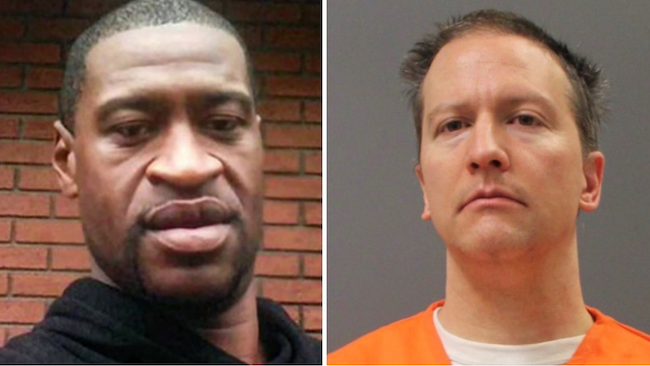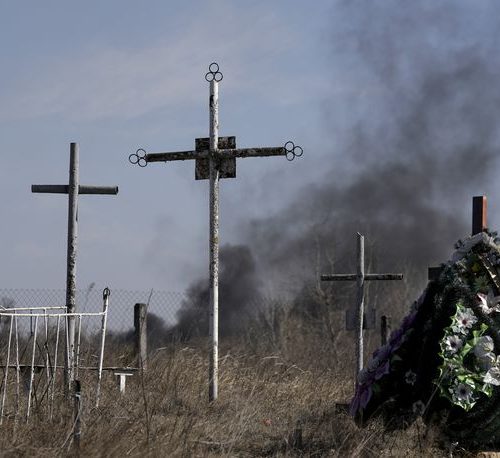By Tim Darnell, Atlanta Journal-Constitution
Troy Warren for CNT
Derek Chauvin, the ex-Minneapolis police officer who was convicted in April of murder and manslaughter charges in the death of George Floyd, will be sentenced Friday.
Floyd died last May after Chauvin, a white officer, pinned his knee on the 46-year-old Black man’s neck for about 9 ½ minutes in a case that triggered worldwide protests, violence and a furious reexamination of racism and policing in the U.S.
Chauvin, 45, was found guilty of second-degree murder, third-degree murder and second-degree manslaughter in Floyd’s death. Chauvin is scheduled to be sentenced at 2:30 p.m. ET Friday, according to reports.
Under Minnesota statutes, Chauvin will be sentenced only on the most serious charge of second-degree murder. That’s because all of the charges against him stem from one act, with one victim.
The max for that charge is 40 years, but legal experts have said there’s no way he’ll get that much. Case law dictates the practical maximum Chauvin could face is 30 years — double what the high end of state sentencing guidelines suggest. Anything above that risks being overturned on appeal.
Judge Peter Cahill could sentence Chauvin to much less. Prosecutors have asked for 30 years, while defense attorney Eric Nelson is seeking probation.
According to The Associated Press, Minnesota has sentencing guidelines that were created to establish consistent sentences that don’t consider factors such as race or gender. For second-degree unintentional murder, the guideline range for someone with no criminal record goes from 10 years and eight months to up to 15 years. The presumptive sentence is in the middle, at 12 ½ years.
Cahill last month agreed with prosecutors that aggravating factors in Floyd’s death warrant going higher than the guidelines. The judge found that Chauvin abused his position of authority, treated Floyd with particular cruelty, and that the crime was seen by several children. He also wrote that Chauvin knew the restraint of Floyd was dangerous.
“The prolonged use of this technique was particularly egregious in that George Floyd made it clear he was unable to breathe and expressed the view that he was dying as a result of the officers’ restraint,” Cahill wrote last month.
Attorneys on both sides are expected to make brief arguments. Victims or family members of victims can also make statements about how they’ve been affected, but none have said publicly that they will.
Chauvin can talk if he wants, but it’s not clear if he will. Experts say it could be tricky for Chauvin to talk without implicating himself in a pending federal case accusing him of violating Floyd’s civil rights.
While some experts say Chauvin won’t talk, Mike Brandt, another defense attorney watching the case, said he thinks Chauvin will speak, and that he can say a few words without getting himself into legal trouble. “If I was him, I think I would want to try and let people know that I’m not a monster.”
Community members can submit impact statements online, and they may become part of the public record.
Cahill will look at arguments submitted by both sides, as well as victim impact statements, community impact statements, a pre-sentence investigation into Chauvin’s past, and any statement Chauvin might make.
No matter what sentence Chauvin gets, in Minnesota it’s presumed that a defendant with good behavior will serve two-thirds in prison and the rest on supervised release, commonly known as parole.
That means if Chauvin is sentenced to 30 years, he would likely serve 20 behind bars, as long as he causes no problems in prison. Once on supervised release, he could be sent back to prison if he violates conditions of his parole.
Since his April conviction, Chauvin has been held at the state’s only maximum security prison, in Oak Park Heights. That’s unusual — people don’t typically go to a prison while waiting for sentencing — but Chauvin is there for security reasons. He has been on “administrative segregation” for his safety and has been in a 10 foot-by-10 foot cell, away from the general population. He has meals brought to his room, and is allowed out for solitary exercise for an average of one hour a day.
It wasn’t immediately clear where he would serve his time after he is sentenced. The Department of Corrections will place Chauvin after Cahill’s formal sentencing order commits Chauvin to its custody.
The three other ex-Minneapolis police officers charged in Floyd’s death will be tried together beginning Aug. 23, a trial also to be held in Hennepin County. Tou Thao, J. Alexander Kueng and Thomas Lane were fired, along with Chauvin, the day after Floyd’s death on May 25, 2020.
The three officers are charged with aiding and abetting unintentional second-degree murder and aiding and abetting second-degree manslaughter, charges that carry up to 40 years in prison. The men remain free on $750,000 bail.
Thao, Kueng and Lane responded to a call about a “forgery in process” but did not directly cut off Floyd’s breathing.
Floyd was arrested on suspicion of passing a counterfeit $20 bill for a pack of cigarettes at a corner market. He panicked, pleaded that he was claustrophobic and struggled with police when they tried to put him in a squad car. They put him on the ground instead.
The centerpiece of the case was bystander video of Floyd, handcuffed behind his back, gasping repeatedly, “I can’t breathe,” and onlookers yelling at Chauvin to stop as the officer pressed his knee on or close to Floyd’s neck for what authorities say was about 9 ½ minutes, including several minutes after Floyd’s breathing had stopped and he had no pulse.
In Other NEWS



































